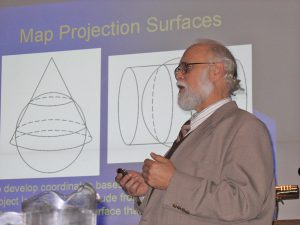 Alan Vonderohe, Emeritus Professor of Civil and Environmental Engineering at UW-Madison, passed away November 5, 2025, in Poynette.
Alan Vonderohe, Emeritus Professor of Civil and Environmental Engineering at UW-Madison, passed away November 5, 2025, in Poynette.
Career
Alan started his professional career assisting a land surveyor in Danville in east-central Illinois, his hometown. It piqued his interests in math, and he went on to complete an undergraduate degree in civil engineering from the University of Illinois Urbana-Champaign (UIUC) in 1970. This was followed by three years as a commissioned officer for NOAA (National Oceanic and Atmospheric Administration) doing hydrographic and nautical work, after which he completed a PhD at UIUC.
Alan taught at UW-Madison from 1979 to 2006. In a 2006 interview, Alan reflected on his career in ways that anyone who knew him will appreciate. For example, he stated that UW-Madison attracted him because of the “open and relaxed environment, and the cordial relationships I observed between faculty, staff, and students… The institution seemed to fit my own personality very well.”
He also welcomed the strong emphasis on teaching at UW-Madison, saying, “Teaching and learning are very important to me. In many ways I’ve been a graduate student throughout my life. I finally figured out how to be paid for it in 1979!”
Alan got a lot of satisfaction from learning and from sharing knowledge with others. He was the consummate teacher, always eager to discuss even the most arcane topics in surveying, geodesy and engineering. His approach was interactive and dialectic, as shown in his “brief book” on the planned transition to the North American Terrestrial Reference Frame.
Alan’s retirement in 2006 coincided with two other retirements — Frank Scarpace and Tom Lillesand — that had a huge impact on UW-Madison’s standing as a leader in land records, surveying and remote sensing.
WISCRS
One of Alan’s biggest contributions to the land information and GIS communities in Wisconsin was his work on WISCRS (Wisconsin Coordinate Reference Systems), the state’s current low-distortion county coordinate reference system framework. WISCRS was designed to replace WCCS (Wisconsin County Coordinate System), an earlier county coordinate reference system developed in the 1990s. WCCS used “enlarged ellipsoids” to produce accurate grid coordinates, something commercial software did not always handle correctly.
In 2004, The Wisconsin Land Information Association (WLIA) created a task force to examine the problem, with Alan and Jerry Mahun (Madison Area Technical College) as task force leads. In 2005, the Wisconsin Land Information Board allocated a Strategic Initiative Grant to Jackson County to redesign WCCS, with Alan leading the redesign effort. Alan was able to produce a new coordinate reference system that avoided the use of the enlarged ellipsoids of WCCS, while yielding coordinate differences of only a few millimeters.
WSRS2022
Long after his retirement, Alan was also heavily involved in the state’s effort to prepare for a new reference system being developed by the National Geodetic Survey (NGS). The new reference system – North American Terrestrial Reference Frame of 2022, or NATRF2022 –introduces the idea of time-dependent coordinates to account for plate tectonic movement and isostatic adjustment of the earth’s crust.
NGS’s plans led to the creation of the Wisconsin Spatial Reference System 2022 Task Force (WSRS2022) under the Geospatial Committee of the Wisconsin Society of Land Surveyors. Starting in 2018, Alan served as co-lead of the Technical Focus Group alongside Glen Schaefer (also retired). The Focus Group developed a proposal to align WISCRS to the new NGS system, a long process that involved much dialog and debate with NGS. Thanks to the efforts of Alan and Glen, Wisconsin was able to retain its 59-zone design to minimize the disturbances caused by the eventual shift to NATRF2022.
Legacy
Alan received a much-deserved “Friend of Land Records Award” from WLIA in 2022. As noted in that award, Alan’s work greatly benefited the land information community in Wisconsin and beyond. This is in addition to his distinguished career of teaching and research, where his ideas impacted students, colleagues and the public. Alan’s work embodied the Wisconsin Idea, the belief that the knowledge and expertise of the University of Wisconsin should positively affect the lives of all citizens of the state.
Alan will be missed by all who knew him and worked with him.
